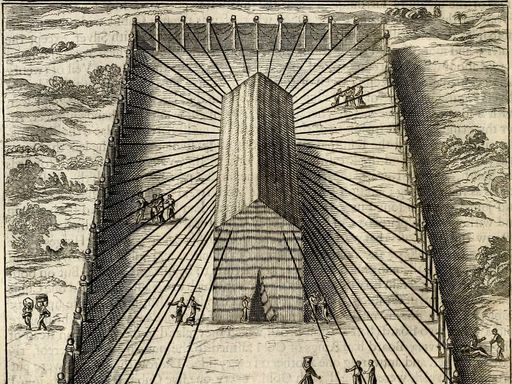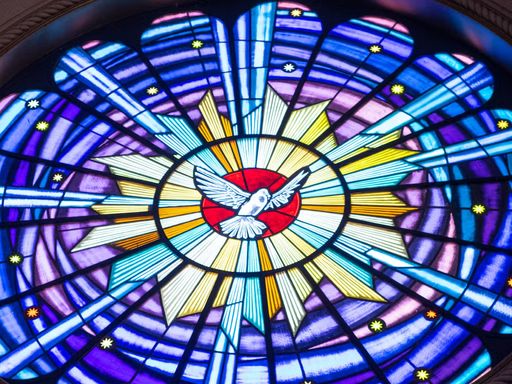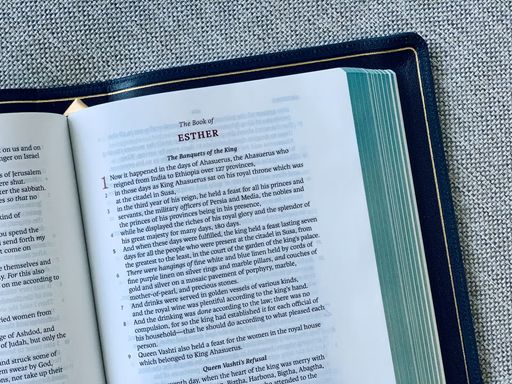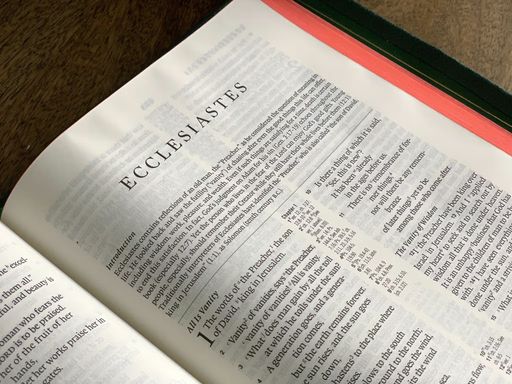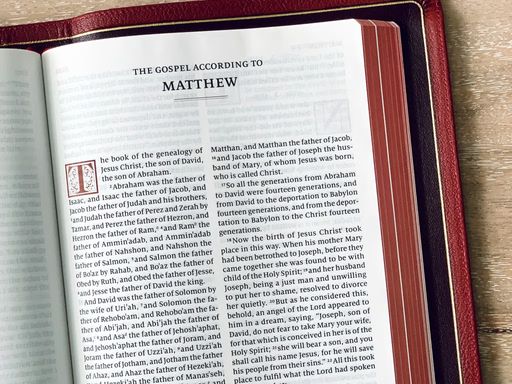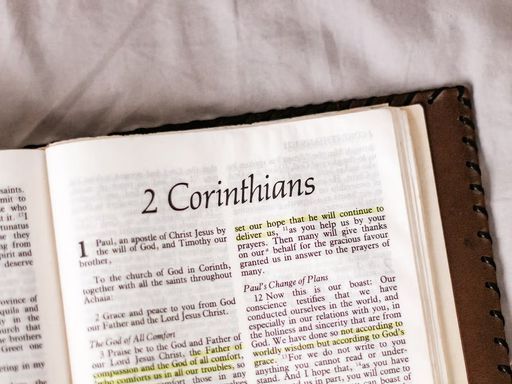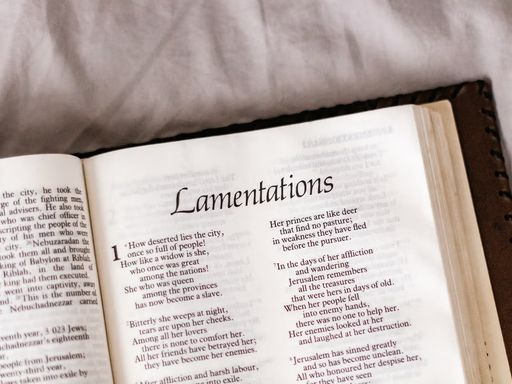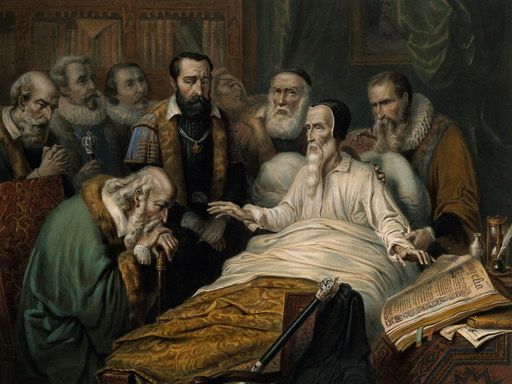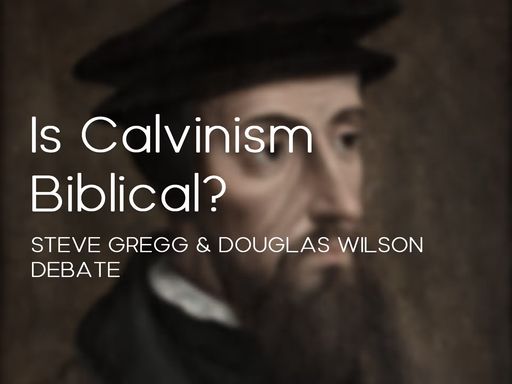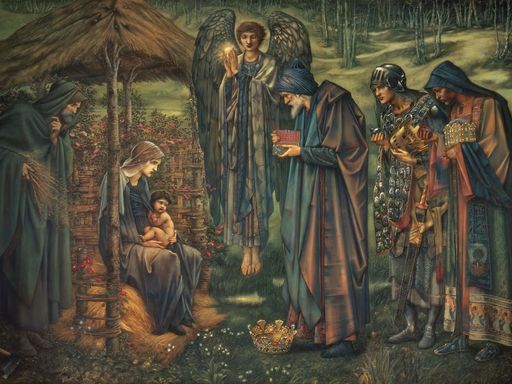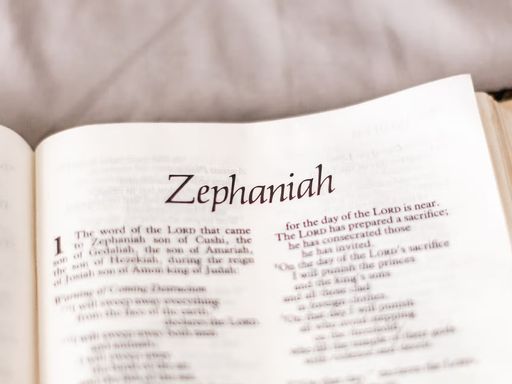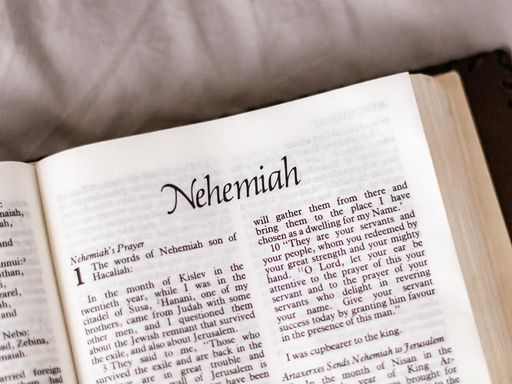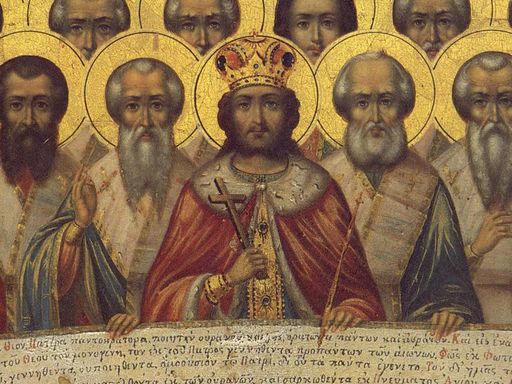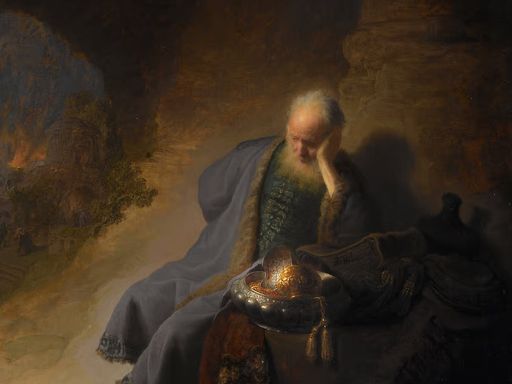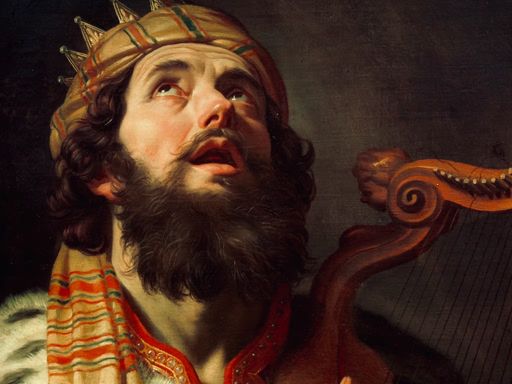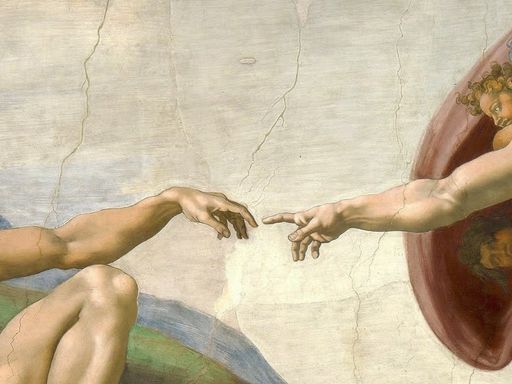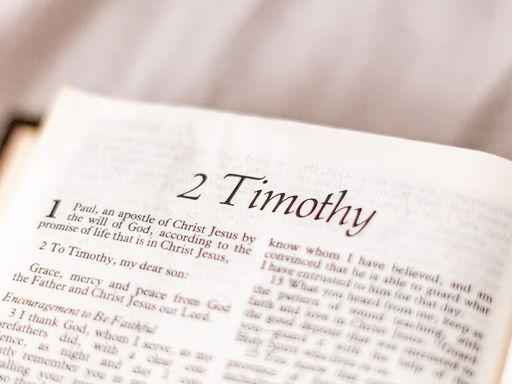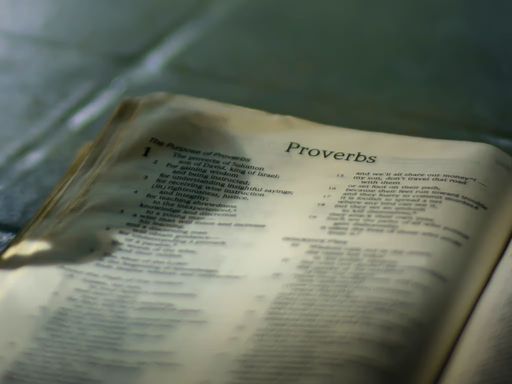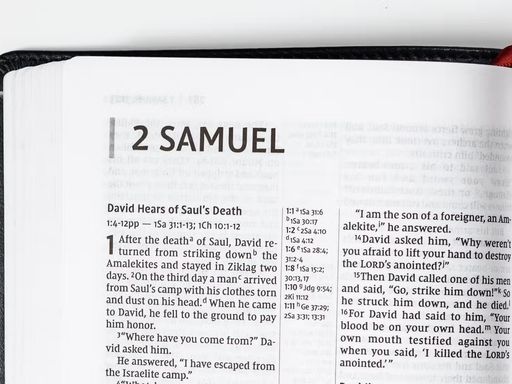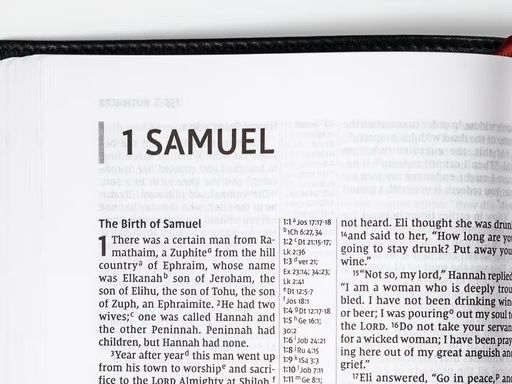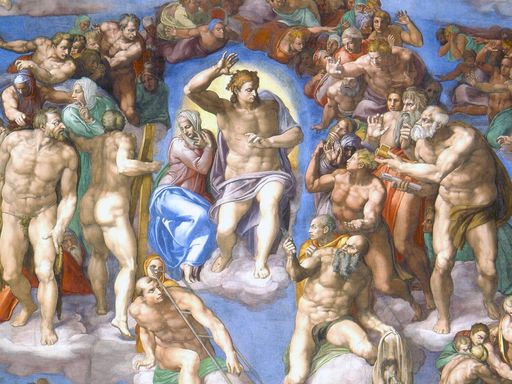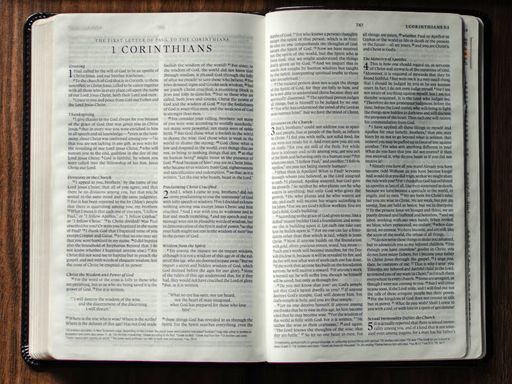
The Life and Teachings of Christ
Steve Gregg
This 180-part series by Steve Gregg delves into the life and teachings of Christ, exploring topics such as prayer, humility, resurrection appearances, and the importance of serving others.

John's Prologue (Part 1)
In John's Prologue (Part 1), Steve Gregg delves into the Gospel of John to gain a deeper understanding of Jesus' life. Gregg explains that John refers to Jesus as the Word, which existed before creation and made all things. While there is no biblical evidence to support the concept of Jesus being th

John's Prologue (Part 2)
In this continuation of John's Prologue, Steve Gregg explores different interpretations of the phrase "born of the Spirit" in John 1:13 and argues in favor of the birth of Jesus as the intended meaning. Gregg also discusses the doctrine of universal presence of God and how it relates to the incarnat

The Genealogy of Jesus
In the New Testament, both Matthew and Luke present the genealogy of Jesus, although there are discrepancies between the two. Matthew's genealogy includes four women, including Tamar, who posed as a prostitute, and Rahab, who was a prostitute, which underscores Jesus' inclusive message of salvation.

Gabriel's Announcement
In this presentation, Steve Gregg takes a detailed look at the Gospel of Luke's account of Gabriel's Announcement. He highlights the credibility and historical accuracy of Luke's narrative, detailing the miraculous births of John the Baptist and Jesus. He also explores the significance of John's arr

Mary Visits Elizabeth
In this text, Steve Gregg examines the birth narratives of John the Baptist and Jesus, discussing Mary's visit to Elizabeth and the fulfillment of ancient prophesies. Mary is acknowledged as blessed among women due to her role as the mother of Jesus, and her response to her mission of bringing Jesus

Birth and Circumcision of Jesus
In this presentation, Steve Gregg delves into the biblical accounts of the birth and circumcision of Jesus. He emphasizes the vital role Joseph played in Jesus' early life and education, teaching him the trade of carpentry. Gregg also explores the prophecy of a virgin giving birth, as well as the si

Early Recognition
In "Early Recognition," Steve Gregg examines the early recognition of Jesus by both Jewish and Gentile people. He discusses Jewish purification rituals, the recognition of Jesus as the Messiah by Anna and Simeon in the temple, and the visit of the Magi, among other topics. He also highlights themes

Childhood of Jesus
In "Childhood of Jesus," Steve Gregg delves into the little-known aspects of Jesus' early life. He discusses how Jesus' family fled to Egypt to escape the wrath of King Herod, and may have supported themselves with gifts from the wise men. Gregg also makes connections between the history of Israel a

The Ministry of John
Steve Gregg provides a comprehensive overview of John the Baptist's ministry and Jesus' baptism as documented in Luke chapter 3. Despite some overlapping material, the genealogies of Jesus in Matthew and Luke are not parallel. John's ministry was to prepare the way for Jesus and his preaching of bap

Baptism of Jesus
In his discussion of the Baptism of Jesus, Steve Gregg presents a detailed comparison of the accounts provided in Matthew and Luke. While some have suggested that Jesus' exceptional abilities come from studying under gurus and masters, the Bible clearly suggests that these abilities were a result of

Temptation of Jesus (Part 1)
In this talk, Steve Gregg discusses the temptation of Jesus in Matthew chapter 4. He notes that while the devil is often thought of as appearing in physical form to tempt people, temptation can also come in the form of subtle suggestions or thoughts. Gregg also explores the symbolism of the forty da

Temptation of Jesus (Part 2)
In this talk by Steve Gregg, he delves into the temptation of Jesus and its symbolic meaning from a spiritual and biblical perspective. According to Gregg, the temptation of Jesus in the wilderness represents not only Jesus' own struggle but also the struggle of Israel, as depicted in the Old Testam

The First Disciples (Part 1)
In this discourse by Steve Gregg, he analyzes the first 18 verses of the Gospel of John, known as the prologue. He discusses the events of four separate days, focusing on the baptism of Jesus, and how it follows chronologically in the Gospel. Gregg also delves into the prophecy of the coming of the

The First Disciples (Part 2)
Steve Gregg delves deeper into the story of the first disciples of Jesus in this talk. He discusses John the Baptist's prophetic role and his initial skepticism of Jesus as the Messiah, as well as the background and beliefs of the disciples. Gregg notes that the disciples' eventual commitment to fol

Water to Wine and 1st Temple Cleansing (Part 1)
In this talk, Steve Gregg delves into John chapter 2 and explores the events surrounding Jesus' attendance at a wedding and the subsequent turning of water into wine. Gregg discusses the significance of Jesus referring to his mother as "woman" and clarifies that this was not a rude or dismissive ges

Water to Wine and 1st Temple Cleansing (Part 2)
In this talk, Steve Gregg discusses the significance of Jesus turning water into wine and cleansing the temple in John chapter 2. He contrasts being filled with wine and being filled with the Spirit, stating that while wine may change our mood, being filled with the Spirit has a spiritual impact. Gr

Nicodemus (Part 1)
In this talk, Steve Gregg interprets John chapter 3 and discusses Nicodemus, a Pharisee who came to Jesus at night to learn more about him. Steve suggests that Nicodemus might have already drawn the conclusion that Jesus was God, but was hesitant to admit it openly. Steve highlights the concept of b

Nicodemus (Part 2)
In this recording, Steve Gregg discusses the second part of Nicodemus from John 3, referencing Romans 7:5-6 and Ezekiel 36 in relation to Jesus' teachings on being born again. He delves into the different interpretations of Ezekiel 36, suggesting that being born again is crucial to forming a spiritu

John Decreases, Jesus Increases (Part 1)
In this talk, Steve Gregg discusses the biblical account of John the Baptist's decreasing popularity and Jesus' increasing prominence. He explains that the success of a ministry should not be measured in terms of the number of followers, but rather in their depth and integrity. John Baptist resigns

John Decreases, Jesus Increases (Part 2)
In this talk, Steve Gregg discusses the shift from John the Baptist to Jesus and how it reflects a future trend in bringing attention to Jesus. While John's fasting and mourning were not effective in attracting people, Jesus embraced a more joyful and social approach. Gregg notes the importance of b

Woman at the Well (Part 1)
In "Woman at the Well (Part 1)" by Steve Gregg, Gregg analyzes the story of the Samaritan woman in John chapter 4. He notes that Samaritans were not considered pure by Jews, and many Jewish people avoided traveling through Samaria. Despite this, Jesus chose to make contact with a Samaritan village a

Woman at the Well (Part 2)
In this talk by Steve Gregg, he discusses the interaction between Jesus and the woman at the well in John 4. He argues that the woman was not a perfect or holy person, but was instead living in an arrangement that was less than perfect. Despite this, Jesus engaged her in conversation and spoke to he

Early Galilean Ministry (Part 1)
In this segment of his teachings, Steve Gregg discusses the early Galilean ministry of Jesus, focusing on Luke 13-14 and John 4. Gregg notes that in John 4, Jesus encounters a woman from Samaria, who testifies about Jesus to the people of Sychar. Gregg explains that the man mentioned in Luke 13 who

Early Galilean Ministry (Part 2)
In this segment, Steve Gregg continues to discuss the early Galilean ministry of Jesus. He emphasizes that Jesus preached about the cancellation of unpayable debt to God, and how his message of spiritual jubilee was relevant for delivering forgiveness to those who received him before the day of veng

1st Sabbath in Capernaum (Part 1)
In this session, Steve Gregg provides an in-depth analysis of Mark chapter 1, emphasizing Jesus' reluctance to accept fame and recognition as a prophet in his own town. He explains Jesus' authority in speaking with confidence and clarity, which set him apart from other religious figures of the time.

1st Sabbath in Capernaum (Part 2)
Steve Gregg discusses the topic of demon possession in Mark 1:23-26 and addresses the claim that Christians can be demon-possessed. He argues that while there is a lack of evidence for demon possession in the Bible, demons can still have a hostile effect on Christians even if they cannot reside in t

Healings, Galilean Ministry (Part 1)
In this talk, Steve Gregg examines the healing ministry of Jesus in Galilee. He highlights how Jesus healed the sick and cast out demons, but did not always permit the demons to speak. Gregg also discusses the use of Isaiah 53 in relation to healing, and points out that although Jesus often healed m

Healings, Galilean Ministry (Part 2)
In his talk, Steve Gregg shares insights on the healing ministry of Jesus in Galilee. He emphasizes the physical and emotional toll that healing and exorcisms took on Jesus, causing him to seek solitude and rest. Despite facing criticism for healing on the Sabbath and breaking Jewish purity laws, Je

More Sabbath Controversies (Part 1)
In "More Sabbath Controversies (Part 1)", Steve Gregg examines the events that occurred on the Sabbath in the book of Matthew. He argues that while Sabbath keeping is one of the Ten Commandments, it is not linked to a moral issue like the other commandments. Jesus healed a man on the Sabbath and whe

More Sabbath Controversies (Part 2)
Steve Gregg discusses controversial topics surrounding the Sabbath and healing in part two of his talk. He argues against a humanistic view of God that places healing as a top priority and emphasizes the importance of trusting God whether or not healing occurs. Gregg also addresses criticisms of Jes

Mercy vs Sacrifice (Part 1)
In a discussion, Steve Gregg compares the concepts of mercy and sacrifice in the Bible, referencing Luke 5 and Matthew 12. He explains that while mercy is a characteristic of God's love, it is important to understand the context in which it is appropriate to fast and mourn. Gregg notes that self-dis

Mercy vs Sacrifice (Part 2)
Steve Gregg continues his discussion on "Mercy vs Sacrifice" in this segment, focusing on the idea that religious rituals and man-made customs should not be grounds for judging one's spiritual worth. He portrays Jesus as dismissing old Jewish customs and traditions, as well as discussing the difficu

Choosing the Twelve (Part 1)
In this talk, Steve Gregg discusses the process of how Jesus chose the twelve disciples, as found in the gospel of Mark. Although there are no indications that Jesus initially intended to select exactly twelve disciples, this number does hold significance in relation to the twelve tribes of Israel.

Choosing the Twelve (Part 2)
In this piece, Steve Gregg discusses the importance of carefully choosing spiritual leaders and evangelists. He emphasizes that not everyone is suited for leadership roles and stresses the significance of discipleship and maturity before ordaining anyone. Gregg also touches on the selection of the a

Beatitudes (Part 1)
In this talk, Steve Gregg explores the Beatitudes found in Matthew chapter 5 and Luke chapter 6. He notes the similarities and differences between the two versions of the sermon and highlights the main differences in the Beatitudes. Gregg emphasizes that the Beatitudes are not about material poverty

Beatitudes (Part 2)
In a discussion led by Steve Gregg, Scriptures from Luke and James are examined in the context of the Beatitudes. Gregg contrasts the Kingdom of Heaven with the Kingdom of God and affirms the importance of having a broken spirit and being a receptor for God. He emphasizes the need for humility and s

Peace and Persecution, Salt and Light (Part 1)
In a discussion of the Beatitudes, Steve Gregg explores the deeper meanings behind being blessed and called the sons of God. He emphasizes the importance of reconciling with God, as without surrendering to Him, there is no hope. Gregg also notes the significance of bearing spiritual characteristics

Peace and Persecution, Salt and Light (Part 2)
In this discussion, Steve Gregg provides an explanation for the analogy of salt and light mentioned in the Bible. He explains how salt was valued in ancient times for its germ-killing and preservative powers, and how its loss of savor represents a decline in its effectiveness. Similarly, the idea of

Christ and the Law, Overview (Part 1)
In this talk, Steve Gregg discusses Jesus' teachings on the law and how they relate to love and spirituality. Gregg emphasizes that Jesus was not simply concerned with outward conformity to the law, but with its spiritual essence. He cautions against legalism and the danger of applying Jesus' comman

Christ and the Law, Overview (Part 2)
In this overview by Steve Gregg, he explores the topic of Christ and the Law, specifically focusing on two illustrations of divorce and oaths. Gregg argues that it is important to be a person of integrity who keeps their word, regardless of whether additional affirmations or oaths are made. He also

Murder and Adultery (Part 1)
Steve Gregg provides a biblical analysis of the Sermon on the Mount, specifically focusing on the topics of murder and adultery. He notes that while the Old Testament law focused on outward obedience, Jesus emphasizes a heart change and the weightier matters of justice, mercy, and faithfulness. Jesu

Murder and Adultery (Part 2)
In this talk, Steve Gregg tackles the controversial topics of murder and adultery, arguing that both should be avoided even in their subtle forms. He argues that although the Sanhedrin and Roman laws may not put someone to death for simply being angry, there are still consequences for negative attit

Divorce and Oaths (Part 1)
Steve Gregg discusses the topic of divorce and oaths, explaining how the Bible emphasizes the importance of faithfulness and the keeping of vows, especially in the context of marriage. He notes that while divorce is not encouraged in the Bible, there are instances where it is allowed, such as in cas

Divorce and Oaths (Part 2)
In this continuation of his lecture series on divorce and oaths, Steve Gregg cites examples from the Bible and modern-day scenarios to discuss the complexity of divorce. While divorce is generally discouraged in the Bible, there are exceptions for cases of infidelity and abandonment. However, oaths

Non-Retaliation and Love of Enemies (Part 1)
In this discourse, Steve Gregg explores the concept of non-retaliation and loving one's enemies. Based on Matthew 5:38-48 and Luke 6, Gregg emphasizes the importance of mercy and kindness towards those who wrong us. He acknowledges that while resistance to evil may be necessary at times, retaliation

Non-Retaliation and Love of Enemies (Part 2)
In this second part of his discussion on Non-Retaliation and Love of Enemies, Steve Gregg emphasizes the importance of taking Jesus' teachings on this matter literally, without seeking loopholes or exceptions. He also discusses the idea that loving our enemies does not mean we must condone their act

Be Not As The Hypocrites (Part 1)
In "Be Not As The Hypocrites (Part 1)", Steve Gregg delves into the concept of righteousness and the importance of behaving in a righteous manner, even though it may not be explicitly required by God. He emphasizes that true religion is not about outward observances, but rather about pleasing God hi

Be Not As The Hypocrites (Part 2)
In this talk, Steve Gregg discusses the dangers of hypocritical behavior in religious settings. He emphasizes the importance of seeking eternal rewards rather than temporal ones, and warns against seeking honor from men rather than from God. Gregg uses the term "hypocrites" to refer to those who pre

Jesus On Prayer (Part 1)
In this teaching, Steve Gregg examines Matthew 6 which includes the Lord's Prayer. He notes that Jesus assumes his disciples will pray and advises them to pray vertically, not horizontally like the heathen. Gregg cautions against vain repetitions and asks for the sake of self-interest, pointing out

Jesus On Prayer (Part 2)
In this segment, Steve Gregg talks about the importance of praying to God and doing His will. He stresses that while it is okay to work towards achieving our needs and desires, praying for them is equally important. Addressing God as "Father" is appropriate as it signifies a personal relationship wi

God and Mammon (Part 1)
In this speech, Steve Gregg emphasizes the importance of aligning personal values with the will of God. He explains that believers should strive to keep their conscience clear, even if it sometimes requires going against popular opinion. Gregg also stresses the need for Christians to prioritize eter

God and Mammon (Part 2)
In "God and Mammon (Part 2)" by Steve Gregg, the speaker emphasizes the need to devote everything in life to the Lord. Even if one is paralyzed and unable to work, they can still serve by teaching Bible studies without worrying about their future. Gregg warns against accumulating material possession

Worry (Part 1)
In this thought-provoking talk, Steve Gregg explores the theme of worry and how it relates to our attitudes towards work, faith, and self-reliance. Using biblical references and personal anecdotes, he argues that worrying is ultimately futile and only serves to undermine our trust in God's guidance

Worry (Part 2)
In this discourse, Steve Gregg emphasizes the futility and harm of worrying. He draws from passages in the Bible and argues that worrying is adopting heathen behavior and an inappropriate response for those who trust in God. Moreover, he suggests that seeking God's will and kingdom should be the foc

Judging (Part 1)
In this discussion, Steve Gregg examines the topic of judging in Matthew chapter 7. While some may interpret the chapter to mean that God is a tolerant figure who overlooks sin, Gregg argues that there is a place for making judgments in the Christian faith. He cites various passages in the New Testa

Judging (Part 2)
In "Judging (Part 2)", Steve Gregg discusses the idea of judging others from a spiritual perspective. While Jesus teaches us to judge righteously, he also warns against judging based on appearances or having a double standard. Gregg emphasizes the importance of having our own spiritual act together

Two Paths, Two Foundations (Part 1)
In this talk, Steve Gregg discusses the importance of seeking guidance from God and taking proper steps towards a spiritual life. He emphasizes the need to pray in Jesus' name and to ask for the Holy Spirit's guidance. Gregg also highlights the significance of prioritizing good deeds and treating ot

Two Paths, Two Foundations (Part 2)
In this continuation of "Two Paths, Two Foundations", Steve Gregg discusses the importance of identifying false prophets and choosing the narrow gate. He stresses that following the royal law means being kind to not only the poor but also to those who are not our friends. Gregg warns listeners to be

Miracles, Eulogy for John (Part 1)
In this lecture by Steve Gregg, he examines the story of the healing of the centurion's servant in Luke 7. Gregg points out that there are slight differences in the telling of the story in Matthew and Luke, but asserts that this is not evidence that the Gospels were not written by the authors to who

Miracles, Eulogy for John (Part 2)
In this speech, Steve Gregg speaks about John the Baptist's life and how he was greater than other prophets before him. He mentions that John's example exhibits the unshakeable faith required to stand firm in the face of adversity. Steve also notes how some prayers are not necessarily what God wants

Elijah, Sinful Woman (Part 1)
In this talk, Steve Gregg discusses the meaning behind Matthew 11, specifically the references to John the Baptist and Elijah. Gregg explains that the forceful proclamation of the Gospel has been a prevailing theme in God's Kingdom, as seen through the ministry of John the Baptist. He also clarifies

Elijah, Sinful Woman (Part 2)
In part two of his talk, Steve Gregg discusses Jesus' statement in Matthew 11:25 about revealing things to "babes" rather than to the "wise and prudent." He explains that Jesus is referring to the burdens of legalistic religious observances, and that he offers a lighter burden for his followers. Gre

Sign of Jonah, Christs Brethren (Part 1)
In this segment, Steve Gregg delves into the "Sign of Jonah" in Matthew chapter 12, which he argues is a specific sign given to the generation. Gregg also discusses the timeline of Jesus' death and resurrection, addressing an apparent contradiction between the Gospels and Paul's account in 1 Corinth

Sign of Jonah, Christs Brethren (Part 2)
In this talk, Steve Gregg discusses the "Sign of Jonah" and its relevance to Christ's brethren. He argues that the demonic possessions described in the Bible were not mere illusions, and that the demonism prevalent during the time of Jesus was a sign of the wicked generation. Gregg also delves into

Blasphemy of the Holy Spirit (Part 1)
In this talk, Steve Gregg explores the concept of "blasphemy of the Holy Spirit" as discussed in Matthew 12 and parallel verses in Mark. He delves into the story of the healing of a demon-possessed man and discusses the potential implications of the man's possession. Gregg also considers the reactio

Blasphemy of the Holy Spirit (Part 2)
In this discussion, Steve Gregg talks about the blasphemy of the Holy Spirit and how it is a rejection of the message of the Spirit. He explains that rejecting the Son can be forgiven, but rejecting the Spirit cannot, and that it is a great mystery as to why. He argues that Satan is the power behind

Two Parables of Seeds Growing (Part 1)
Steve Gregg teaches on two parables of seeds growing in Mark chapter 4, which include the parable of the sower and the parable of growing seeds. Gregg explains that Jesus used parables to obscure the truth from those who were not interested in fully understanding his message. He goes on to examine t

Two Parables of Seeds Growing (Part 2)
In this talk, Steve Gregg discusses two parables about the growth of seeds. The first parable describes how some people receive the word of God and bear fruit, while others do not. The second parable conveys how the growth of the kingdom of God is dependent on God's work and not just on human effort

Wheat and Tares, Dragnet (Part 1)
In this discourse, Steve Gregg reflects on the parable of the wheat and the tares from Matthew 13, which deals with the growth of the kingdom of God. He explains that the enemy maliciously sowed tares among wheat as a way to cause harm. Gregg draws significance from the fact that the parable of the

Wheat and Tares, Dragnet (Part 2)
In this message, Steve Gregg discusses the parables of the wheat and tares, and the dragnet. He emphasizes that it is not the church's job to separate the wheat from the tares or the good fish from the bad fish, as that is reserved for God's angels during the last judgment. While churches should pra

Destiny and Value of the Kingdom (Part 1)
In this talk, Steve Gregg explores the parables of the mustard seed and the leaven in Matthew 13. While on the surface, these parables may seem to imply the success and growth of the kingdom of God, Gregg draws attention to the presence of birds and leaven, which can represent evil and corruption. H

Destiny and Value of the Kingdom (Part 2)
In this piece, Steve Gregg discusses the parables of the hidden treasure and the pearl of great price, exploring the themes of sacrifice, discipleship, and the value of the kingdom of God. He notes that both parables highlight the need for individuals to forsake their worldly possessions in order to

Stilling the Storm (Part 1)
In this discussion, Steve Gregg talks about the story of Jesus stilling the storm in Mark chapter 4. He explains that this story is not just about Jesus being a miracle worker, but also about him being the Lord who stills the storms. Gregg draws parallels between this story and Psalm 107, which spea

Stilling the Storm (Part 2)
In "Stilling the Storm (Part 2)," Steve Gregg discusses the concept of God's faithfulness and goodness amidst trials and tribulations. He argues that Christians should not lose faith during storms, as God is in control, even if it may not seem that way at the time. Gregg also touches upon the topic

Man of the Tombs (Part 1)
In this talk, Steve Gregg discusses the well-known biblical story of the man possessed by demons and healed by Jesus. He addresses the apparent contradictions in the different mentions of the story in the Gospels and emphasizes the meekness of Jesus in dealing with the situation. Gregg also points o

Man of the Tombs (Part 2)
In "Man of the Tombs (Part 2)", Steve Gregg explores the motivations behind the demons' request to be sent into the pigs in the biblical story of the man possessed by demons. While it remains unclear why the demons preferred to inhabit the pigs and why they chose to harm themselves, Gregg suggests t

Jairus Daughter, Issue of Blood (Part 1)
In this talk, Steve Gregg explores the stories of Jairus' daughter and the woman suffering from an issue of blood in Mark chapter 5. He emphasizes the importance of faith in receiving help and acknowledges that sometimes individuals need to withdraw and pray in order to be refreshed. Gregg also addr

Jairus Daughter, Issue of Blood (Part 2)
Steve Gregg discusses the story of Jairus' daughter and the healing of the woman with the issue of blood, both examples of Jesus performing miraculous healings. Gregg notes that Jesus does not pray for the dead to rise in these instances, but rather utilizes a command to bring them back to life. He

Missionary Discourse (Part 1)
In this discourse, Steve Gregg examines Matthew chapter 10 verses 5-15 where Jesus gives instructions to His disciples before sending them out to preach the gospel. Jesus prays for laborers, and after mobilizing them, they are instructed to preach to the lost sheep of Israel. Gregg points out that t

Missionary Discourse (Part 2)
In this discourse, Steve Gregg discusses the responsibilities and rewards associated with missionary work. He emphasizes the importance of freely giving without expecting anything in return, quoting biblical passages that support this idea. Gregg also advises against exploiting invitations for popul

Missionary Discourse (Part 3)
In this discourse, Steve Gregg discusses how Jesus prepared and sent out his twelve disciples as emissaries to the cities of Israel. He emphasizes that modern-day Christians should not compromise their beliefs and should instead strive to emulate Jesus' lifestyle. Gregg notes that while rejection an

Missionary Discourse (Part 4)
In this discourse, Steve Gregg discusses the topic of heaven and hell and how it relates to Christian beliefs. He explains that as Christians, we are discipled to believe that death leads to glorification and that God is not someone who punishes and destroys souls. Instead, He values each one of us,

Nazareth, Johns Death, 5,000 Fed (Part 1)
In this discourse, Steve Gregg discusses several stories from early in Jesus' ministry. He delves into the skepticism and unbelief of the people of Nazareth, exploring how their preconceptions of Jesus as a mere carpenter hindered them from accepting his miraculous abilities. Gregg highlights the im

Nazareth, Johns Death, 5,000 Fed (Part 2)
In this discussion, Steve Gregg examines the story of Herod and John the Baptist, highlighting the prevalence of guilt and paranoia in those who act wickedly. Gregg also touches on John's rebuke of Herod for his unlawful marriage, and how this resulted in his arrest and subsequent beheading. The dis

Walking on Water, Bread of Life (Part 1)
In this talk, Steve Gregg delves into John chapter 6, focusing on the walking on water and bread of life stories. He clarifies the context of these stories, noting the eyewitness account of John and dispelling misconceptions such as the idea that Jesus was walking along the seashore instead of on wa

Walking on Water, Bread of Life (Part 2)
In "Walking on Water, Bread of Life (Part 2)," Steve Gregg explores the theme of eternal life found in John 6. Gregg notes that the idea of eternal life kept intact by faith in God's work is a major theme in the discourse. He also discusses the concept of the first resurrection and the creation of a

Traditions of Men (Part 1)
Steve Gregg explores the traditions of men in Mark chapter 7, where the Pharisees and scribes questioned why Jesus' disciples did not follow the tradition of washing their hands before eating bread. Jesus responded by referencing prophesies in Isaiah and Hosea, stating that the people honor with the

Traditions of Men (Part 2)
In this talk, Steve Gregg discusses the danger of legalism and the importance of avoiding human traditions in religious worship. He argues that while traditions can be meaningful, they should not be elevated to the same level as the commandments of God. He emphasizes the need to continually seek spi

Traditions of Men (Part 3)
In this lecture, Steve Gregg discusses the dangers of blindly following traditions that are not supported by the Bible. He cites an example from Matthew 15 where Jesus rebukes the Pharisees for prioritizing their own traditions over God's commandments. Gregg emphasizes the importance of being aware

Traditions of Men (Part 4)
Steve Gregg discusses the importance of controlling one's thoughts and words in accordance with Christian beliefs. He emphasizes that negative speech, even if it seems harmless, can stem from a wicked heart and lead to sinful behavior. Gregg cautions against letting desires, whether natural or not,

Syrophenician Woman, 4,000 Fed (Part 1)
In this discussion, Steve Gregg analyzes the story of the Syrophoenician woman who pleaded for Jesus to heal her daughter. Initially, Jesus appeared to ignore her plea, stating that his priority was to the Jews. Despite this, the woman persisted and expressed her faith in Jesus' ability to heal. Thi

Syrophenician Woman, 4,000 Fed (Part 2)
In this discussion, Steve Gregg unpacks the biblical story of the Syrophoenician woman who Jesus healed and fed a multitude of people. Gregg examines the use of the term "healed" and discusses the possibility of the woman being demonized, rather than physically ill. He also delves into the theologic

Signs, Leaven, Peters Confession (Part 1)
In this talk, Steve Gregg discusses the topic of signs, leaven, and Peter's confession, drawing from various passages in the Bible. He touches on the importance of compassion as the driving force behind Jesus' miracles, rather than showing off his authority. Gregg also points out the danger of being

Signs, Leaven, Peters Confession (Part 2)
In this segment, Steve Gregg delves into the significance of Mark 8 and the concept of leaven in the Bible. He emphasizes the importance of having spiritual discernment and not becoming hardened to the truth. Further, he highlights how Jesus uses the analogy of leaven in both negative and positive w

Caesarea Philippi (Part 1)
In this discourse, Steve Gregg provides an overview of the role of Peter in the early Christian church as portrayed in the Bible. He argues that while Peter was a visible leader among the apostles, he was not necessarily the chief leader or head of the Church. Rather, Peter had special needs and was

Caesarea Philippi (Part 2)
In this talk, Steve Gregg discusses the meaning of Jesus' statement about binding and loosing in Caesarea Philippi. Gregg explains that Jesus was giving his apostles authority to initiate actions on earth that would be reflected in heaven. He suggests that this may also apply to the binding and loos

The Transfiguration (Part 1)
In this discourse, Steve Gregg provides his interpretation of the transfiguration of Jesus as described in the Bible. He analyzes the Greek words used, identifies discrepancies and inconsistencies in the text, and offers his exegetical arguments in favor of Jesus referring to the destruction of Jeru

The Transfiguration (Part 2)
In this piece by Steve Gregg, he discusses the Transfiguration and the appearance of Moses and Elijah. He notes that their presence is significant because they represent the Law and the Prophets in the Old Testament, which makes them important to the Jewish religion. While Jesus was not at the same

Demonized Boy (Part 1)
In this segment, Steve Gregg analyzes Mark chapter 9 and Luke 9.37, discussing the story of a demon-possessed boy. He questions if demons confer mental conditions upon people and considers the possibility of demons trying to kill the boy through epilepsy. Gregg notes the limited understanding of dat

Demonized Boy (Part 2)
In this talk, Steve Gregg discusses the story of the demonized boy from the Bible and provides his insights on the subject of demonization. He questions the age of the boy and whether demons can be inherited through generations. Gregg notes that faith is preferable, but lack of faith is not a limita

Peters Fish, Children (Part 1)
In this segment from Steve Gregg's teaching on Matthew 17, he discusses the story of Peter and the temple tax. While Jesus never explicitly confirms or denies paying the tax, Peter anticipates that Jesus does not pay it. Gregg emphasizes that while tithing is not obligatory for Christians, giving ge

Peters Fish, Children (Part 2)
In "Peters Fish, Children (Part 2)" by Steve Gregg, the importance of children in the ministry is discussed through the teachings of Jesus. According to Gregg, having leadership without children or having leadership over children can lead to problems in raising a family or managing a household. Jesu

Reconciliation (Part 1)
In this talk, Steve Gregg discusses the importance of reconciliation within the Christian community. He emphasizes the need to handle interpersonal conflicts internally, rather than turning to outside sources like the court system. Gregg asserts that the goal of confronting someone who has sinned ag

Reconciliation (Part 2)
In this piece, Steve Gregg discusses the topic of reconciliation in a church community. He suggests that a person who has been kicked out of a church for not following the standards upheld by the community should not be condemned, but instead should be approached with zeal and a desire to vindicate

Three Almost Disciples (Part 1)
In this talk, Steve Gregg discusses the concept of following Jesus geographically, as seen in the Gospel of Luke and Matthew. He explores the idea of leaving behind settled conditions and cultural expectations in order to pursue Christ wherever he leads. While it may not necessarily involve physical

Three Almost Disciples (Part 2)
In "Three Almost Disciples (Part 2)", Steve Gregg discusses three individuals who were almost disciples of Jesus. He breaks down the stories of these three individuals and how their responses to Jesus' invitations varied. He examines the various reasons why someone might hesitate to answer the call

The Feast of Tabernacles (Part 1)
In this talk, Steve Gregg focuses on John 7:1-53 and explores Jesus' decision to attend the Feast of Tabernacles in Jerusalem. Gregg emphasizes that Jesus' public teaching often elicited mixed opinions, with some considering him a good man and others thinking the opposite. He notes that Jesus did no

The Feast of Tabernacles (Part 2)
In "The Feast of Tabernacles (Part 2)," Steve Gregg uses biblical passages to examine the ways in which Jewish leaders attempted to arrest Jesus. Despite their efforts, Jesus continued to teach, even speaking of living water and other symbolic concepts. Gregg notes that different commentators have d

The Woman Taken in Adultery (Part 1)
In this presentation, Steve Gregg explores the well-known biblical story of the woman taken in adultery. While some scholars argue that the passage probably wasn't written by John, but rather by one of the synoptic gospel writers, Gregg believes that it is an authentic story of Jesus. He points out

The Woman Taken in Adultery (Part 2)
In this talk, Steve Gregg discusses the story of the woman taken in adultery from the Bible. He argues that the Pharisees' attempt to trap Jesus with a moral quandary fails because their own hypocrisy is exposed. While Jesus doesn't condone the woman's actions, He shows her mercy, saying "Let him wh

A Question of Pedegree (Part 1)
In this session, Steve Gregg discusses John Chapter 8 and the story of the woman caught in adultery. He emphasizes how Jesus is not alone in testifying, as the Father and four other witnesses have testified to his identity. Gregg also delves into the concept of Jesus being both fully God and fully h

A Question of Pedegree (Part 2)
In this continuation of "A Question of Pedegree," Steve Gregg examines the concept of genuine discipleship and the dangers of mediocrity and nominalism in Christianity. He emphasizes the importance of a true relationship with Jesus and the need to keep God's laws to please Him. Gregg also addresses

Man Born Blind (Part 1)
In this talk, Steve Gregg discusses the story of the man born blind in John chapter 8. He addresses some troublesome points in the text, such as the age of Jesus during the conversation and the assertion that the disciples believed in reincarnation. He also delves into the significance of the statem

Man Born Blind (Part 2)
In this discourse, Steve Gregg reflects on the story of the Man Born Blind in John chapter 5. Despite the multitude of sick people that gathered at the Pool of Bethesda to be healed, Jesus chose to heal this particular man as an act of God. The Pharisees questioned the man's former blindness, but up

Good Shepherd, Sending the 70 (Part 1)
In this talk, Steve Gregg analyzes John chapter 10 and discusses the parable of the Good Shepherd. He points out the differences between the true shepherd who cares for his sheep and the false ones who only seek to benefit themselves. Gregg emphasizes that the true shepherd will lay down his life fo

Good Shepherd, Sending the 70 (Part 2)
In this segment, Steve Gregg discusses the idea of whether Jesus excluded anyone from his teachings. While some may view his teachings as exclusionary, Gregg argues that Jesus is inclusive and invites everyone to access his teachings. He goes on to discuss how Jesus is like a shepherd, laying down h

The Good Samaritan (Part 1)
Steve Gregg explores the well-known parable of the Good Samaritan in Luke 10, highlighting the importance of measuring true goodness and the standard by which it should be measured. He also discusses the two great commandments of loving God and loving your neighbor as yourself, as well as the signif

The Good Samaritan (Part 2)
In this talk, Steve Gregg discusses the parable of the Good Samaritan and its implications for acts of compassion in everyday life. He reflects on the notion of chance and the role of individual agency when it comes to helping others, using the example of a priest who failed to aid a wounded man on

Fear of Man and Fear of God (Part 1)
In this talk, Steve Gregg discusses the importance of prioritizing listening to God over serving Him. He uses the story of Mary and Martha to illustrate this point, stating that Martha's focus on serving took precedence over listening to Jesus, while Mary's willingness to listen was praised by Jesus

Fear of Man and Fear of God (Part 2)
In this talk, Steve Gregg discusses the fear of man versus the fear of God. He points out that fearing man over God can harm one eternally, while fearing man cannot hurt one physically. He emphasizes the importance of spiritual well-being over bodily well-being and warns against succumbing to hypocr

Misc. Teachings, Feast of Dedication (Part 1)
In this teaching by Steve Gregg, he discusses various topics related to the Feast of Dedication. Gregg opines on the motivations of the people who followed Jesus during his time, stating that some may have hoped for a political overthrow of the Romans. He then delves into the story of the fruitless

Misc. Teachings, Feast of Dedication (Part 2)
In this teaching, Steve Gregg discusses various topics related to Jesus and the Father, the Trinity, miracles, and the meaning of Psalm 82. He suggests that people may have a wrong mental picture of Jesus and the Father as separate beings, and that it is not necessary for salvation to understand the

Teachings in Perea (Part 1)
In this teaching, Steve Gregg discusses the concept of being a disciple of Jesus and the importance of striving to follow him in every aspect of our lives. He touches upon the idea that it is not enough to simply claim belief in Jesus and attend church, but rather we must actively make him the prior

Teachings in Perea (Part 2)
In his teachings, Steve Gregg discusses the story of a man with dropsy, whom Jesus healed on the Sabbath, and draws similarities between this story and the parable of the banquet in Luke chapter 14, in which Jesus encourages people to invite those who cannot repay them to their feasts. Gregg also em

Parables of Lost Things (Part 1)
In this talk, Steve Gregg discusses three parables from Luke 15 that all share a common theme of lost things being found. The parables emphasize God's concern for the lost and the joy and celebration that comes when they are found. Although there are theological debates about the decision points in

Parables of Lost Things (Part 2)
In "Parables of Lost Things (Part 2)", Steve Gregg delves into the story of the prodigal son from Luke 15. He discusses the cultural context of the time and how the young son's actions would have been scandalous in Middle Eastern culture. Gregg draws parallels between the story and the fall of man i

Parables of Eternal Destiny (Part 1)
In this Parables of Eternal Destiny discussion, Steve Gregg delves into the meaning of Luke 16, focusing on the parable of the unjust steward. He explains how money is a physical good for purchasing things in the natural sphere, but also a blessing and a test from God. Gregg explains that the stewar

Parables of Eternal Destiny (Part 2)
In this continuation of his talk, Steve Gregg delves into a few specific biblical verses and parables to shed light on eternal destiny. He discusses the importance of repentance and the consequences of adultery in marriage, emphasizing the value of pleasing God rather than focusing solely on earthly

No Offense (Part 1)
In this talk, Steve Gregg delves into the meaning of the word "offend" in Luke chapter 17. He explains that being offended means being irritated or feeling resentful, and that it's natural to experience it from time to time. However, he emphasizes that choosing not to be offended is essential for ma

No Offense (Part 2)
In this talk, Steve Gregg discusses the issue of being easily offended as a Christian. He cites Proverbs 19:11 as evidence that it is an honorable thing to choose to slow down your anger and overlook transgressions. Gregg argues that being easily offended can negatively impact one's own spiritual we

10 Lepers, Day of the Lord (Part 1)
In this discussion, Steve Gregg reflects on the story of the ten lepers healed by Jesus in the Bible. He explains that the term "leper" was used somewhat loosely in biblical times and did not always refer to a specific skin disease. Gregg notes that the racial differences between the lepers were ecl

10 Lepers, Day of the Lord (Part 2)
In this talk, Steve Gregg discusses the topic of the Day of the Lord and the concept of the Kingdom of God. He clarifies that the Kingdom of God is within us and not a physical entity. He notes that the Day of the Lord is an important theme throughout the scriptures and compares it to the time of No

Lazarus (Part 1)
In this discussion, Steve Gregg analyzes John chapter 11, focusing on the story of Lazarus. Gregg addresses the differences in the accounts of Lazarus in Luke and John, and questions their historical accuracy. He highlights the lack of witness accounts from Lazarus himself and argues that his resurr

Lazarus (Part 2)
In this recording, Steve Gregg provides a detailed analysis of the biblical story of Lazarus, focusing on Martha's faith and Jesus' bodily resurrection of Lazarus. Gregg explains how Jesus' call to action, even in the face of danger, is an indication of God's plan for humanity to be productive and e

Children, Rich Young Ruler (Part 1)
Steve Gregg discusses Jesus' interaction with children and the rich young ruler in Matthew 19. Gregg explains that Jesus rebuked his disciples for preventing the children from coming to him and used the opportunity to teach them about the kingdom of God. He also discusses the difficult question abou

Children, Rich Young Ruler (Part 2)
In "Children, Rich Young Ruler (Part 2)," Steve Gregg explores the conversation between Jesus and the rich young ruler, focusing on the question of what it takes to inherit eternal life. Jesus first reminds the man that only God is truly good and then encourages him to keep the commandments. While J

Ambitious Leaders, Barbimaeus (Part 1)
In this piece, Steve Gregg discusses Jesus' teachings in Mark chapter 10, specifically focusing on the concept of suffering and how it relates to ambition in leadership. He notes that Jesus frequently spoke of the difficulty in entering the kingdom of God and the inevitability of persecution for bel

Ambitious Leaders, Barbimaeus (Part 2)
In this talk, Steve Gregg discusses the importance of servant leadership and being role models for others. He emphasizes that Christians should not think in terms of worldly categorizations or opinions, but rather provide leadership through service to others. Gregg also addresses some potential crit

Zacchaeus, 10 Minas, Triumphal Entry (Part 1)
In this discourse, Steve Gregg discusses the biblical account of Zacchaeus, a rich chief tax collector whom Jesus invited to his house. Despite criticisms from the Pharisees, Jesus had lunch with Zacchaeus, and he even pledged to make amends and return fourfold whatever he had wrongfully taken. Greg

Zacchaeus, 10 Minas, Triumphal Entry (Part 2)
Steve Gregg discusses the story of Zacchaeus and the parable of the minas in relation to the triumphal entry of Jesus into Jerusalem. Gregg highlights the importance of stewarding one's possessions and resources in service of the kingdom of God. He also notes the political implications of Jesus' act

Cleansing the Temple, Fig Tree, Grain of Wheat (Part 1)
In this lecture, Steve Gregg discusses the events leading up to Jesus cleansing the temple in Matthew 21. Gregg suggests that Jesus' cursing of the fig tree was a symbolic representation of Israel's state, as he found it barren and unfruitful. Additionally, Gregg notes that there may be indications

Cleansing the Temple, Fig Tree, Grain of Wheat (Part 2)
Steve Gregg suggests that Christians are not wrong in praying for vengeance and vindication against their adversaries. He points to Revelation 6 as an example of perfect prayers being offered to God for justice. However, Gregg cautions against taking a fully literal interpretation of the symbols and

Two Pointed Parables (Part 1)
In "Two Pointed Parables (Part 1)," Steve Gregg examines a pericope in Matthew 21 where Jesus is questioned by the Sanhedrin about his authority. The passage includes a parable about two sons, one of whom initially refuses to work in the vineyard but later has a change of heart and goes to work whil

Two Pointed Parables (Part 2)
In "Two Pointed Parables (Part 2)", Steve Gregg discusses two parables in the Bible. The first parable is about builders rejecting the cornerstone, leading to the entire building not following the blueprint. The second parable is about Israel being God's field, vineyard and building, with the questi

Wedding, Render Caeser, Resurrection (Part 1)
In this discourse, Steve Gregg unpacks a parable in Matthew 22 about a king who invites guests to his son's wedding banquet, only to be rejected by some. Gregg offers a three-part interpretation of the parable, which he relates to the Resurrection and Christ's second coming. He also explains the clo

Wedding, Render Caeser, Resurrection (Part 2)
In this discussion, Steve Gregg explores Jesus' response to the debate on whether it was lawful to pay taxes to Caesar. Jesus used a coin with Caesar's stamp to make the point that supporting the government requires citizens to pay taxes, but emphasized that God should come first. The discussion als

Confrontation Continues (Part 1)
In this presentation, Steve Gregg discusses the ongoing confrontation between Jesus and religious leaders such as the Pharisees and Sadducees during his time. Jesus uses parables and questions to reveal the hypocrisy of the religious leaders and emphasize the importance of loving God and one's neigh

Confrontation Continues (Part 2)
In this discussion, Steve Gregg highlights the importance of the distinction between being born of the seed of David according to the flesh and being declared as the Son of God according to the Spirit. He also emphasizes the need for humility and service, warning against seeking positions of honor a

Woe to Scribes and Pharisees (Part 1)
Steve Gregg speaks about Jesus' condemnation of the scribes and Pharisees in Matthew chapter 23, highlighting their rejection of the truth and hypocritical behavior. He notes that the scribes and Pharisees may have acknowledged Jesus but were intimidated and put up stumbling blocks to prevent his te

Woe to Scribes and Pharisees (Part 2)
In this discussion, Steve Gregg examines Jesus' critique of the Pharisees, focusing on their externalism and lack of right priorities in religious practice. Jesus warns the scribes and Pharisees of their hypocrisy, greed, and complicity in the persecution of prophets, predicting the impending destru

Olivet Discourse (Part 1)
In this discourse on the Olivet Discourse, Steve Gregg explores the context and meaning of Jesus' prediction of the destruction of the temple in Jerusalem and the end of the age. While acknowledging the existence of the idea of a seven-year tribulation, he highlights the lack of reference to it bein

Olivet Discourse (Part 2)
In this discussion, Steve Gregg explores the significance of the Holy Spirit in Christianity and its role as a comforter after Jesus' ascension. He also delves into the historical context of the Olivet Discourse in Matthew 24, which discusses the end of the Jewish age and the destruction of the temp

Olivet Discourse (Part 3)
Steve Gregg provides an interpretation of the Olivet Discourse in relation to the events leading up to the destruction of the temple in 70 AD. He argues that "this generation" refers to the contemporary audience of Jesus' time and notes that the phrase "Son of Man coming" should be viewed in context

Olivet Discourse (Part 4)
In this talk, Steve Gregg discusses several debated interpretations of the Olivet Discourse. He addresses questions of literal versus hyperbolic statements, the meaning of "the end," and the interpretation of the abomination of desolation. Gregg argues that the Discourse is primarily about the destr

Anointing, Last Supper (Part 1)
Jesus is the target of a plot by the Jewish religious authorities to kill him before the Passover season. During the same time, a woman anoints Jesus with costly perfume, an act of love and devotion that some criticized as wastefulness. Jesus defends her, predicting that her gesture will be remember

Anointing, Last Supper (Part 2)
Steve Gregg discusses the Last Supper and the significance of Passover in Christianity. He emphasizes that Jesus established a new covenant with God through his blood and body, as part of the Last Supper. Gregg also critiques the Catholic Church's doctrine of transubstantiation, arguing that the ide

Foot Washing, Leadership (Part 1)
In this piece, Steve Gregg takes a closer look at John 13 and the importance of interpreting Jesus' promises in the upper room discourse. Specifically, the passage focuses on the act of foot washing, which Jesus uses to demonstrate the importance of humility and servitude as traits of a good leader.

Foot Washing, Leadership (Part 2)
Steve Gregg explores the themes of foot washing, apostleship and the new commandment of Jesus in this discussion. While foot washing may not be a normative practice in Christianity, it teaches the principles of servanthood and humility which can be exemplified through modern-day acts of humble servi

Upper Room Discourse (Part 1)
In his discourse to his disciples, Jesus repeatedly speaks about his imminent departure and return, promising to send the Holy Spirit as a Helper and emphasizing duties and responsibilities for his apostles. He warns against being too attached to the world and calls for obedience to his commandments

Upper Room Discourse (Part 2)
Steve Gregg discusses several key points from the Upper Room Discourse in this talk. He notes that the disciples will face challenges, but they should not be troubled as joy will come. Jesus also talks about "father's house mansions", but this does not refer to heaven in the Old Testament context. G

Upper Room Discourse (Part 3)
Steve Gregg discusses the recurring themes in the Upper Room Discourse in John 14-17, including the promise that believers will do greater works than Jesus, a concept that is difficult to understand and interpret. While some individuals, such as John Wimber and Reinhardt Bonke, may hold the status o

Upper Room Discourse (Part 4)
In the fourth part of his discourse, Steve Gregg explores the topic of healing and the different means through which God may heal people, including medical and natural means. He emphasizes that loving Jesus is shown through obedience to His commandments, and those who keep His commandments are promi

Upper Room Discourse (Part 5)
In this discourse, Steve Gregg discusses various aspects of the teachings of Jesus, including the promise of the Holy Spirit, the peace available through Him, and the significance of His sacrifice on the cross. He emphasizes that the peace of a Christian is not dependent on external circumstances, b

Upper Room Discourse (Part 6)
In the sixth part of his Upper Room Discourse, Steve Gregg delves into the metaphor of the branch and vine, emphasizing the importance of abiding in Christ and producing fruit through faith. He highlights that the ability to maintain faith and remain attached to Christ requires effort and trust in H

Upper Room Discourse (Part 7)
In this discourse, Steve Gregg explains Jesus' instructions to his disciples before his crucifixion. Jesus warns his disciples about the trials they will face and why he is telling them so. Steve emphasizes that Christ's love and grace transform people's nature, unlike the condemning and judgmental

Upper Room Discourse (Part 8)
In this discourse by Steve Gregg, he discusses the role of the Holy Spirit, how Jesus compares his departure with labor pains, and the importance of trusting in God. Gregg explains that the Holy Spirit reveals things that people need to know and is not in contradiction to the teachings of Jesus and

Jesus Prayer for the Church (Part 1)
In this prayer for the Church, Jesus asks the Father to keep the name of His disciples and sanctify them in truth. He also asks that His disciples and all believers may be one with Him and the Father, so that the world may believe that the Father has sent Him. Jesus' authority over people is seen in

Jesus Prayer for the Church (Part 2)
In this piece, Steve Gregg explores Jesus' prayer for the church in John 17. Gregg emphasizes the importance of believing not just in the name of Jesus, but also in his character and teachings. Jesus prayed for his followers to be sanctified and unified, and to share in his glory. Gregg notes that h

Gethsemane (Part 1)
Steve Gregg explains the account of Jesus in the Garden of Gethsemane found in Mark chapter 14. Jesus was troubled and stressed by the severity of what he was about to face. He specifically asked his disciples to stay awake and pray to avoid temptation, showing that prayer is a powerful weapon again

Gethsemane (Part 2)
In "Gethsemane (Part 2)", Steve Gregg discusses the events leading up to Jesus' arrest and crucifixion. He explores the mysterious incident of a young man who fled naked after laying hold of Jesus, as well as Peter's failed attempt to defend Jesus with a sword. Jesus ultimately accepted his sufferin

Jesus on Trial (Part 1)
In his discussion of the trial of Jesus, Steve Gregg examines the hypocritical charges brought against him in Jewish and Roman courts. Despite his disciples' denials and the violation of Jewish laws during the trial, Jesus remained steadfast and defended his words. The importance of confessing one's

Jesus on Trial (Part 2)
In the second part of his reflection on the trial of Jesus, Steve Gregg explores the theme of false testimonies and how they can be used to twist the truth. He also compares the different accounts of the trial and the events surrounding Judas' death and the purchase of a field. Gregg suggests that t

Condemned by Pilate (Part 1)
In "Condemned by Pilate (Part 1)," Steve Gregg discusses the trial of Jesus before Pilate in John 18:28-38. Topics discussed include Judas' repentance, Pilate's skepticism regarding the charges against Jesus, the hypocrisy of the Jewish leaders, Pilate's knowledge of Jesus prior to his trial, and Je

Condemned by Pilate (Part 2)
In "Condemned by Pilate (Part 2)," Steve Gregg recounts the trial and crucifixion of Jesus Christ, highlighting Pilate's reluctance to condemn him and ultimate decision to prioritize his own reputation over Jesus' release. Jesus remained calm and composed during his trial, rebuking those who sought

The Crucifixion and Burial (Part 1)
In "The Crucifixion and Burial (Part 1)", Steve Gregg provides a detailed account of the crucifixion of Jesus, including the seven statements he made while on the cross and the significance of events such as the tearing of the veil in the temple. He notes that while the Gospels provide an objective

The Crucifixion and Burial (Part 2)
In this discussion, Steve Gregg examined the events of the crucifixion and burial of Jesus. He demonstrated how the fulfillment of Old Testament prophecies proved Jesus' death and ultimate resurrection. Gregg explained the significance of the Passover lamb's unbroken bones and the separation of wate

Resurrection Appearances (Part 1)
Steve Gregg discusses the resurrection appearances of Jesus in the Gospels of Matthew, Mark, Luke, and John. Despite differences in these accounts, they can be harmonized to demonstrate that Jesus fulfilled prophecies and rose from the dead. Gregg notes that the number of times Jesus appeared to ind

Resurrection Appearances (Part 2)
Steve Gregg discusses various aspects of Jesus' resurrection appearances in this presentation. He explains that some appearances were not immediately recognized, and that the Sanhedrin paid off guards to spread false rumors about the disciples stealing Jesus' body. Gregg also touches on lesser-known

Sea of Galilee, The Great Commission (Part 1)
In "Sea of Galilee, The Great Commission" presented by Steve Gregg, the focus is on post-resurrection appearances of Jesus. One of the peculiarities mentioned is the possibility of John chapter 21 being an afterthought appendix. The author discusses in detail the significant events that took place w

Sea of Galilee, The Great Commission (Part 2)
In "Sea of Galilee, The Great Commission (Part 2)", Steve Gregg explores the commissioning of the disciples and the importance of spreading the gospel. He emphasizes the need for Christians to prioritize loving and serving God, rather than judging others for their religious practices. Gregg also dis


